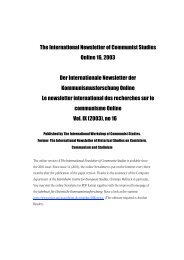VOL. XVI (2010), NO 23 - The International Newsletter of Communist ...
VOL. XVI (2010), NO 23 - The International Newsletter of Communist ...
VOL. XVI (2010), NO 23 - The International Newsletter of Communist ...
Sie wollen auch ein ePaper? Erhöhen Sie die Reichweite Ihrer Titel.
YUMPU macht aus Druck-PDFs automatisch weboptimierte ePaper, die Google liebt.
<strong>The</strong> <strong>International</strong> <strong>Newsletter</strong> <strong>of</strong> <strong>Communist</strong> Studies Online <strong>XVI</strong> (<strong>2010</strong>), no. <strong>23</strong> 81<br />
expressed its sympathies for the Bolsheviks. However, these revolutionary groups had rather<br />
vague ideas about <strong>of</strong> the proletarian revolution, the events in Soviet Russia and the essence<br />
<strong>of</strong> the Soviet power; the overwhelming majority <strong>of</strong> the Mexican leftists were strongly<br />
influenced by anarchism and revolutionary syndicalism. <strong>The</strong> revolutionary events in Russia<br />
were frequently interpreted according to anarchist and syndicalist beliefs and stereotypes,<br />
and the Mexican socialists perceived it as an example <strong>of</strong> direct action which had been<br />
carried out by an active minority under libertarian slogans. Borodin's arrival and his influence<br />
on some socialist leaders were the essential factors which accelerated the developments<br />
within the left movement <strong>of</strong> Mexico. <strong>The</strong> authority <strong>of</strong> the emissary from Moscow was probably<br />
quite significant, as he allowed himself to write a message to the PCM on behalf <strong>of</strong> the<br />
Executive Committee <strong>of</strong> the Comintern and to speak confidently about the future admission<br />
<strong>of</strong> the party as soon as its delegation would arrive in Moscow and as soon as he (Borodin)<br />
would have raised the question before the ECCI. 6 <strong>The</strong> main “value” <strong>of</strong> the new <strong>Communist</strong><br />
party was Manabendra Nath Roy, as he would be very useful in the Eastern sphere <strong>of</strong><br />
Comintern activity, considered a priority at the moment. While Borodin was still on the way to<br />
the Western Hemisphere, Lev Trotskii wrote on August 5, 1919: “<strong>The</strong> road to India may<br />
prove at the given moment to be more readily passable and shorter for us than the road to<br />
Soviet Hungary. <strong>The</strong> sort <strong>of</strong> army which at the moment can be <strong>of</strong> no great significance in the<br />
European scales can upset the unstable balance <strong>of</strong> Asian relationships <strong>of</strong> colonial<br />
dependence, give a direct push to an uprising on the part <strong>of</strong> the oppressed masses and<br />
assure the triumph <strong>of</strong> such a rising in Asia. […] [T]he international situation is evidently<br />
shaping in such a way that the road to Paris and London lies via the towns <strong>of</strong> Afghanistan,<br />
the Punjab and Bengal.” 7<br />
At the same time Borodin’s “Mexican plans” also appeared rather ambitious. He had<br />
suggested that the leaders <strong>of</strong> the PCM should create a Latin American bureau <strong>of</strong> the 3 rd<br />
<strong>International</strong> with the purpose to carry out propaganda all over the continent and to<br />
strengthen relations between <strong>Communist</strong> organizations and groups. 8 <strong>The</strong> bureau's<br />
Provisional Committee published a Manifesto with an appeal to the workers <strong>of</strong> Latin America<br />
to take part in the <strong>Communist</strong> Congress which would unite the proletarian forces on the<br />
principles <strong>of</strong> class struggle and would create a permanent Executive Committee <strong>of</strong> the Latin<br />
American bureau <strong>of</strong> the 3 rd <strong>International</strong>. 9 <strong>The</strong> idea <strong>of</strong> a bureau was also <strong>of</strong>fered to the<br />
Mexican President Venustiano Carranza during the informal interview he gave to Borodin,<br />
and this fact is quite indicative. Moscow and the Mexican left wing movement strongly<br />
believed that the bureau's activities would not spoil relations between the two revolutionary<br />
governments; quite the opposite, they were sure that the bureau's anti-imperialist attitude<br />
would coincide with the Mexican authorities' anti-American orientation. Actually, the Mexican<br />
radical left wingers and their Comintern supervisor tried to find a semblance <strong>of</strong> semi-<strong>of</strong>ficial<br />
patronage by the government. However, the reaction <strong>of</strong> the president was also characteristic:<br />
he evaded from a direct answer and limited himself to sending warm regards to Lenin. <strong>The</strong><br />
Mexican authorities perfectly knew that there were numerous foreigners among the leaders<br />
<strong>of</strong> the newly born <strong>Communist</strong> movement, and that this directly contradicted Article 33 <strong>of</strong> the<br />
Constitution which forbade participation <strong>of</strong> foreign citizens in Mexican home affairs. <strong>The</strong>y<br />
were well informed, but at the same time limited themselves to passive monitoring <strong>of</strong><br />
6 RGASPI, 495/108/1, 9-10.<br />
7 Jan M. Meijer (ed.): <strong>The</strong> Trotsky Papers 1917-1922. I: 1917-1919, London-<strong>The</strong> Hague-Paris, Mouton & Co., 1964,<br />
pp. 6<strong>23</strong>-625.<br />
8 Borodin to PCM, n/d. RGASPI, 495/108/1, 6.<br />
9 Manifiesto del Buro Latinoamericano de la III Internacional a los trabajadores de América Latina. In: Oposición,<br />
<strong>23</strong>-28.8.1979.














